Let's Talk About OPEN-AIR PRISONS
Have you sought out the 'openair prison' in your city and helped the youth living there? If not, what makes you an expert or gives you the right to criticize an 'openair prison' far away in Gaza?
You can listen to me read this essay here:
I’m trying to do better at sharing messages from subscribers, so before I get started, here’s one from John who recently gave a generous gift through Ko-Fi:
Karen, Through your writing you have enriched my life in many ways. Perhaps the most important has been by strengthening - and sometimes restoring - my convictions. I enjoy your essays so much, and I'm really grateful to you... my gift is the least I can do. I hope hearing from me helped to blunt the attacks from others yesterday. You're doing God's work, Karen, and I think many of those critics will be reading your essays again very soon. Warmly, John
This touched my heart and renewed my energy to keep writing. Thank you to everyone who makes my writing possible.
I’ve been thinking about this accusation going around, that Israel has forced Palestinians to live in an “openair prison”.
If anyone has imprisoned Palestinians, it’s Hamas. I’ve written about this before, so I’m not going to argue the point here. What I’m curious about is why those making these accusations of Israel aren’t more concerned about the openair prisons in their own country, in their own cities.
I remember Candace Owens saying in an interview how “shocked” she was to find out Arabs were forced to live in an “open air prison” in Jerusalem. The interviewer looked surprised, as if he couldn’t believe her ignorance. “Uh, that’s called the Arab quarter,” he said. “You know, like the Italian or Jewish quarters, Chinatown, Koreatown, in US cities. Nobody forces them to live there, they choose to.” Candace Owens wasn’t very happy with the revelation, but, whatever, she just moved on to other lies.
Israel hasn’t relegated anyone to an openair prison. That's what Western nations like Poland did to the Jews. The famous photo below shows Jewish men, women and children surrendering to Nazi soldiers during the Warsaw Ghetto Uprising, May 1943.
Far from imprisoning Palestinians, and despite the constant threat of terrorism, Israel has let thousands of Palestinians into the country to work and study. Many of those Palestinians betrayed Israel by collecting intelligence for Hamas’s Oct 7th attack.
What would our response be in the Unites States if we had our own Oct 7th, the culmination of years of terrorist and rocket attacks on our citizens. We know what our response would be, we know how we would demand retaliation. But these people who insist on calling Israel a genocidal apartheid state never acknowledge that answer because it would upend their obsessive determination to demonize Israel. How else can they justify their hatred of Jews; those Zionists who are so evil they dare to defend a homeland they have no right to inhabit.
I have news for you. We are all Zionists in our own countries.
We all want a safe homeland. We all expect our government to defend us with a strong military. Right now, across Europe, Great Britain and the United States, citizens are angry that their governments aren’t doing more to stop the invasion of illegal immigrants that threaten their security, their safety, their right to live freely in their own countries. Illegal immigration is perhaps the biggest issue of this presidential election.
If we have reason to demand a safe homeland in which to raise our children, Israel has a hundredfold the reason, especially after Oct 7th. Israel didn’t create an openair prison, they are fighting to secure their borders from invasion.
But we in the United States do have openair prisons, within our very own cities.
I’m from Los Angeles. I know about these prison-neighborhoods because I spent a lot of time advocating for the youth who live there. I co-founded InsideOUT Writers, a creative writing program for incarcerated youth. Here are examples of neighborhoods where the youth I worked with grew up.
The most dangerous neighborhood in Los Angeles is Downtown LA. Based on FBI crime statistics, the violent crime rate is very high in Downtown LA, making it 12 times as dangerous as the national average. When property crimes are included, the overall crime rate in Downtown Los Angeles is 530% higher than the national average. According to LAPD statistics, there were 1,654 violent offenses reported in 2023. In addition, the murder rate downtown was at an all-time high of 490 in 2018.
The third most dangerous area in Los Angeles is Leimert Park.
Located in South Los Angeles, Leimert Park is a residential neighborhood full of Spanish Colonial Revival homes and tree-lined blocks. It has a rich history, and famous musicians such as Ella Fitzgerald and Ray Charles have lived in Leimert Park. However, it also has a high crime rate compared to the rest of the city and country. Leimert Park experiences 184% more violent crime than the rest of Los Angeles and 540% more than the rest of the US. Property crime is 128% higher than the national average, and your odds of being the victim of a crime in Leimert Park are 1 in 14.
Leimert Park is especially meaningful to me since I was married to Walter Hubert Leimert III. It was my second marriage. We all have our weaknesses and I’m the first to admit I haven’t made the best choices in the men I married—but I have 3 beautiful children from my two marriages so how can I say anything except it was well worth it and was meant to be. You can find out more about my experiences raising children as a single mother on the mean streets of LA suburbia in Finding Courage in Paradise Lost
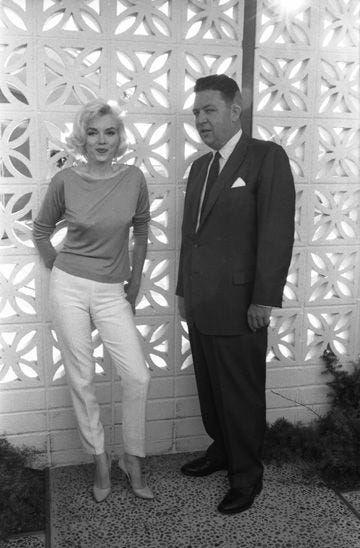
I loved teaching those young people in juvenile hall. I learned so much from them, in so many unexpected ways. I spent time in the homes of their families. I sat in on my students’ trials. Sometimes, I gave them my clothes to wear in court, I remember giving one sixteen-year-old girl my shoes, even though they were way too big for her, because she had no family. I have friends to this day, more than twenty-five years later, that I met behind those prison walls.
I paid a high price for doing this work.
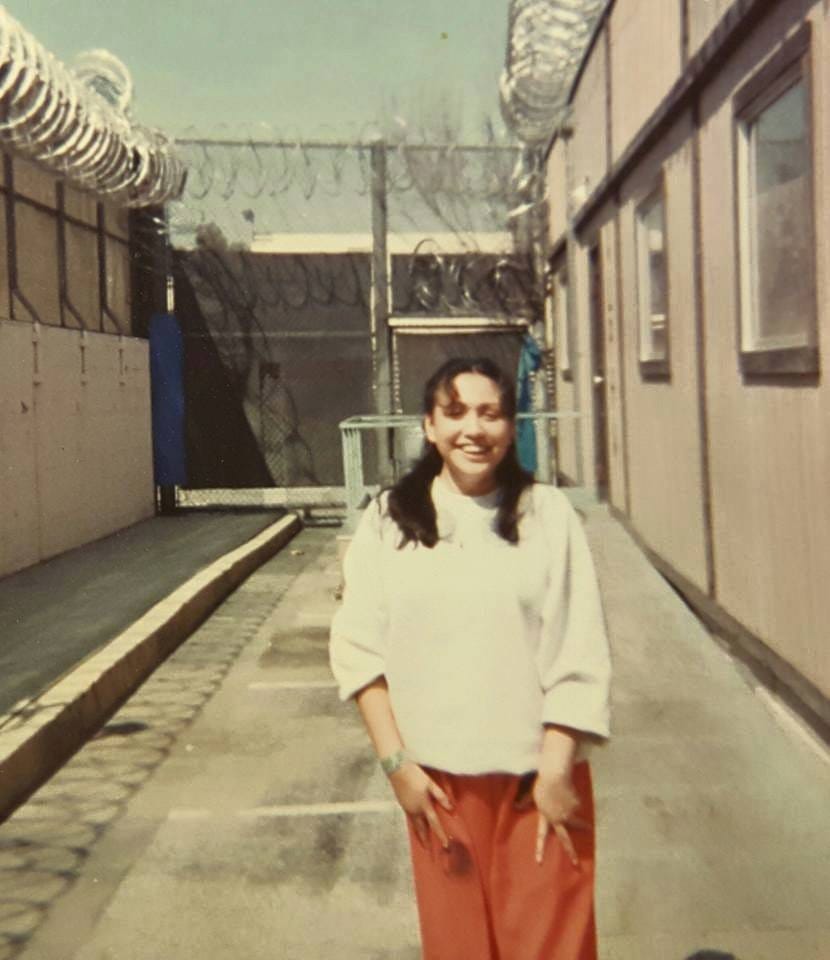
When my husband divorced me, the divorce papers said it was because I chose to spend my free time with criminals. I taught creative writing for one hour on Saturday mornings as a volunteer, while he spent the entire day golfing at the LA Country Club. What I did was worthless while what he did was important. (Some of the reasons why I chose to work with these youth are explained in this Los Angeles Times article.)
Have you ever been inside a juvenile hall? If you live in Los Angeles, go visit Central Juvenile Hall, one of the oldest in the country, and see for yourself what a prison for children looks like. It is dehumanizing.
Here is a 4-minute film by InsideOUT Writers. The special unit that you see in the film was being built when I started IOW. It was for High-Risk Offenders (HROs), young men facing life sentences for serious crimes. I was the first creative writing teacher to go into this facility once it was finished.
The United States incarcerates more children than any other country in the world.
Often once convicted, youth are moved from juvenile hall to remote, prison-like facilities cut off from their families and communities. I taught in these facilities, too, so I know what they are like. I taught in all three LA country juvenile halls, and many of the other facilities and camps.
The neighborhoods these children grow up in are the openair prisons from which they cannot escape. They will seldom cross over into our world. They will stay down in the gutter where most people think they deserve to be, because, you know, they should be able to “pull themselves up by their own bootstraps”.
My experience working with these youth is one reason why I call my writing here “Break Free”. I was passionate about giving a voice to these voiceless youth by providing a safe space where they were free to tell their stories. I then published those stories so those outside their enclosed world could find out they weren’t the “Super-Predators” Hillary Clinton called them.
I wanted people to understand that they were born with the same hopes and fears as everyone else’s children, except they grew up under far more abusive, terrifying conditions and something needed to be done about it.
“There but for the grace of God go I”.
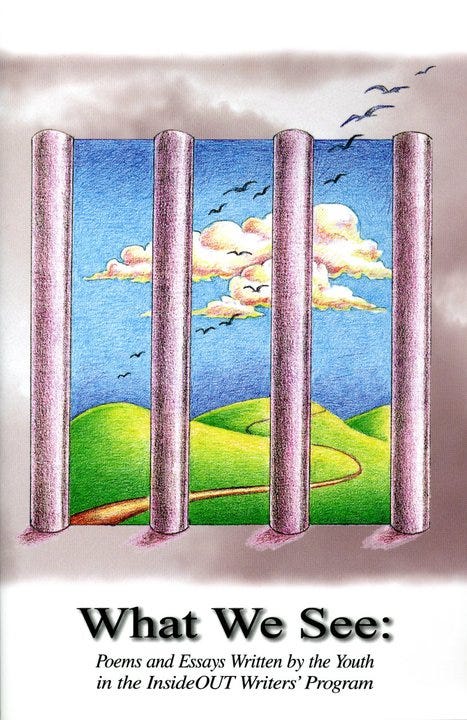
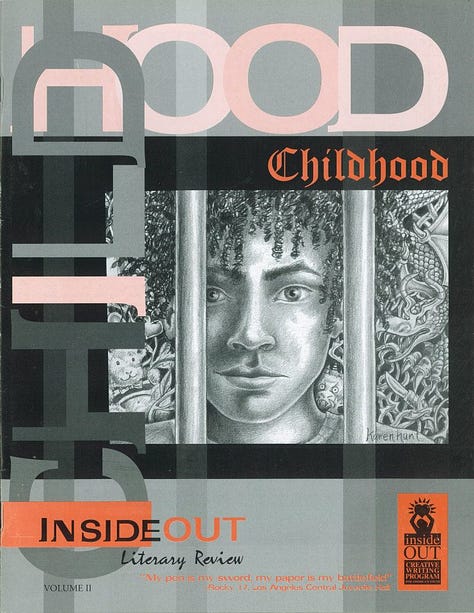
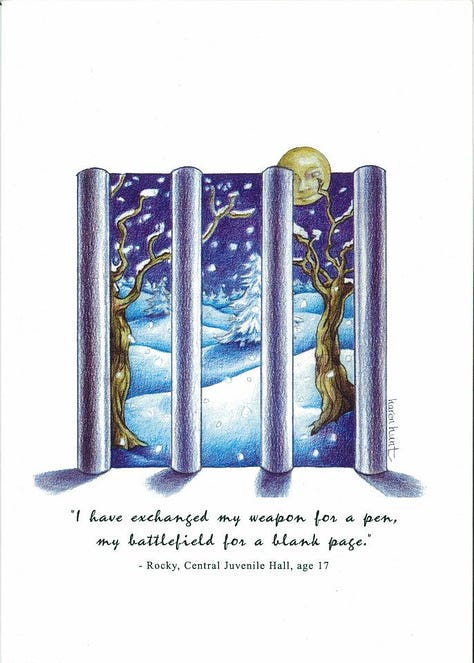
The photos above show 1) the book of student writing I published that was used in schools, detention facilities and university courses. 2) The quarterly magazine that highlighted our students writing, including interviews of people that could inspire them. The last magazine issue before I was ousted had an interview with Stan Tookie Williams, founder of the Crips. It was Tookie’s final interview before he was executed by the State of California. 3) The last photo is of a Christmas card I drew one year and sent out to our students and supporters. I also did the artwork for the book of student writing.
The words of one of our first students, Rocky, became the theme for IOW:
“I have exchanged my weapon for a pen, my battlefield for a blank page.”
Many of the kids I taught lived ten/twenty miles from the beach, but they had never been there. They had never been outside their own neighborhoods.
One girl told me how she was terrified to go to school because getting there was like walking through a war zone. She had to cross over into enemy territory, and it was dangerous. Streets are controlled by gangs, and it can be hard sometimes to even go from one street to the next. The school didn’t understand the challenges she faced and finally, she just gave up going to school at all.
A friend of mine who is an elite bodyguard, told me how when he was a boy, maybe eight years old, the police used to pick him up and drop him off in enemy territory so he would have to make his way home, knowing he could potentially be killed on the dangerous journey. The police thought it was funny. His family was from a powerful drug cartel. He didn’t ask to be born like that, but he was. He got out of it because he was an exceptional person, but most people aren’t exceptional. You might ask yourself how exceptional you would be in the same situation? Look at your own world. Are you a rebel, or do you follow the path of least resistance so you can live as easy and as safe a life as possible?
Marlon, a young man in the writing program described how he joined a gang. He was walking down the street with his friend one day. Marlon’s friend was a couple of years older and was in a gang. Suddenly, kids from a rival gang came around the corner carrying bats and knives. In that moment, Marlon had to make a choice. He could stand there which would mean aligning himself with the rival gang, or he could run with his friend. He ran. From that moment on, Marlon was in his friend’s gang and the other gang was his enemy. It was that simple. That’s how it worked.
I would ask those of you who are reading this, do you know what I’m talking about? Have you ever sought out the openair prison in your city, showing compassion to the youth that live there? Have you ever looked into the eyes of a gang kid and asked what his life was like?
You probably think, oh, it’s useless. I can’t do anything. Besides, it’s dangerous in those neighborhoods. I’m white and privileged, they’re black or brown and, well, they hate me. Or you might be black or brown, but the last thing you want to do is associate with those you, too, look down on.
It’s not my fault, you say. It has nothing to do with me that they are a lost cause.
But then, suddenly, you are an expert on Israel’s “openair prison”. Suddenly, you are justified in condemning an entire country under siege, blaming them for fighting back.
I’ve gone into the history of Gaza elsewhere, but just to recap, Israel left Gaza in 2005, and the Gazans voted in Hamas. They made their choices. You can pause here and listen to the best 7-minute explanation of Israel’s right to defend itself by firebrand Brigitte Gabriel:
Again, that’s not the point of what I’m saying here, I just have to remind people because I know someone will bring it up in the comments as an argument against what I am saying.
Forget about criticizing Israel for a moment. Until you can answer with humility what YOU are doing to help those in your own openair prisons, you have no right to condemn a country far away. If you don’t understand nor can you fix your own country’s problems, why are you telling someone else’s country how they should fix their problems?
Let me share a little bit about what happened to me when I founded InsideOUT Writers, which helps explain why I get angry at people who sit cozily at home typing their condemnation as if they think by doing that, they are somehow contributing something of value.
I did what I could with the talents I had to stop the demonization of inner-city youth, in my own city. I did this through opening windows of communication, through the telling of stories. I believed this was the most powerful way of connecting people who misunderstand one another. I still believe this—more than ever.
I co-founded InsideOUT Writers, a nonprofit, with a nun, Sister Janet Harris. She was very famous. I was not. I focused on building the program while she brought in her powerful connections. I ended up in constant conflict with these people from an elite world that I was not a part of, nor did I want to be. There’s a lot more to the story, but the end result is that I was ousted, thanks in large part to the nun’s desire to be the only founder, my name was struck from the history and the website, everything. It was hard to bear. It was like losing a child, I had given my heart and soul to building the program over many years.
I mention it here because nothing of actual value is ever easy, it takes getting up and doing something, not sitting and criticizing others about it. It takes sacrifice, sweat and tears. Sometimes it means making tough choices. It means people hating you for refusing to compromise your integrity for the sake of ‘growth’ or ‘progress’.
Even if I hadn’t been ousted, I never would have lasted since the nun and those powerful corporate leaders, government officials and celebrities were, of course, incredibly woke. Those of you who have read enough of my writing, know that I’m incapable of shutting up and fitting in for the sake of my own self-preservation. I just can’t. On the other hand, I saw how charity work among the elite is often used as a front to appear as if they care, a way to impress one another as they babble about their favorite charities at exclusive parties.
I recently came across the story of one Israeli soldier, Captain Barak Deri and I related to him because of my own experiences forming IOW and my hope of breaking down barriers through communication.
I remember how in the United States we rejected our own soldiers after they came home from Vietnam as if they were monsters, when they had simply been young men serving their country under horrific conditions, often not understanding why they were fighting. Now, young Americans who have never had to defend their homeland and are ignorant of war, turn around and condemn Israeli soldiers.
Israelis know very well what they are fighting for—the existence of their homeland—and they believe in it with all their hearts. What right do we have to condemn Israelis for defending their country when we sent our own young men far across the sea, not to defend our borders against invasion, but to fight for “democracy” on foreign soil. And then, when they came home, we blamed them, turned them into the scapegoats to assuage our guilt.
I am drawn to Barak Deri because his actions prove that he is doing something positive, not just talking about it. He demonstrates how a soldier can be a hero. Long before Oct 7th he was doing what he could for the cause of peace. Along with two other military men, he founded Israel-is, a mandatory nonpolitical program young people take once they leave the military.
Many Israelis take off to travel the world to decompress after their service. They unwittingly become ambassadors for Israel, with an opportunity, just by being themselves, to change people’s perceptions about Israel.
According to Israel-is website:
Israel-Is aims to connect young Israelis and their peers worldwide. By doing so, we are building strong bonds with diverse groups of people, including backpackers, social media influencers, and young Arab leaders from the Middle East and North Africa. These encounters allow us to remove barriers, share and hear authentic stories, and initiate a new and positive conversation about Israel and Israeli society globally. Our vision is predicated on the understanding that in our world, people connect with one another before connecting with ideas. Therefore, it is the authentic, personal story that has the power to dispel biases and forge deeper understandings of contemporary life in Israel and the region.
The goal of the training is not to teach these young people how to win an argument about Israel, but how to avoid having an argument altogether. By the end of the conversation, they still might not like the State of Israel and what it does, but they will hopefully like the Israeli they were speaking to.
The first step, the instructor explains to participants, is to thank them for the question and mean it. “It’s not their fault that they’ve only heard bad things about Israel,” he said.
This is exactly the goal that I had with InsideOUT Writers. To change people’s perceptions by sharing stories. I saw the miracle at the writing table, how youth who were enemies on the street, black against brown, gang against gang, became friends by sharing their stories, by realizing that the things drawing them together were greater than the things tearing them apart. What they were inside was what mattered. It was outside influences that made them think they had to hate one another.
I’m curious. Does Hamas or Hezbollah have organizations like this? Hamas-is, Hezbollah-is. Do they want to build bridges of understanding and make peace, focusing on what unites us rather than what tears us apart? Just asking. If you find some evidence of this, please let me know.
Captain Deri started Israel-is long before Oct 7th. Here’s what happened to him on that fateful day and afterwards. Amazingly, none of it changed his hopeful outlook. I am copying an article here:
I’ve never seen death like that’: Be’eri hero recounts battlefield fight that almost killed him
In London to mark October 7, Captain Barak Deri still hopes for peace.
Captain Barak Deri was on an elite raid inside Gaza battling seven terrorists, when the blast of a Hamas grenade threw him to the ground, metal shrapnel piercing his chest. Lying in a pool of blood, legs contorted, and severely wounded, he was shot multiple times at close range. In what seemed like his final moments, Deri managed to grab a grenade and hurl it at his attackers.
Then, the rescue began.
Deri was airlifted out of Gaza, barely clinging to life on a journey he was not expected to survive, and taken to an Israeli hospital where he remained unconscious for seven days.
Since that deadly December battle, nearly a year ago, the wounded veteran has endured 33 surgeries. This week, he stood in Hyde Park, addressing tens of thousands at the October 7 memorial. Speaking from his hotel before the event, Deri shared his hopes for the future and why he refuses to see himself as a victim.
“I’m not a victim. I chose this. As bad as it is, it’s also been the greatest experience of my life – nearly dying, then being alive again. Now everything has more strength to it, life is more powerful.”
The 32-year-old’s war story began on the morning of October 7. His three brothers were at the Nova festival when news broke that terrorists had breached the border. As he left his home in Tel Aviv, where he works as a startup founder, Deri faced the toughest decision of his life: head to Kibbutz Be’eri with his unit or search for his brothers. Understanding the existential threat facing Israel, he followed orders and entered the besieged kibbutz.
The battle on Route 232 raged all morning as Deri’s unit tried desperately to enter the kibbutz. By midday, his unit had lost several vehicles and soldiers, and they pushed into Be’eri where the fighting continued into the night.
“We fought hundreds of terrorists, moving from house to house. We suffered heavy losses. We tried to save as many families as we could – sometimes we succeeded, sometimes we didn’t.”
Before October 7, Deri’s military service from 2011 to 2017 had largely involved intelligence work for an elite unit. He had never shot anyone. Now, his body bears the scars of war, both inside and out.
“I’d never seen death like that before.”
One of Deri’s close friends, David Meir, died in his arms that day. The fellow reservist left behind a wife and a seven-month-old baby.
Deri continues to grapple with the trauma. “I’ve been diagnosed with PTSD. Dealing with this has become my life’s fight.”
He hasn’t yet been able to speak with the families of those who died alongside him, nor those he saved at Be’eri. “I’ve stayed away because I don’t think I’m ready.”
After October 7, Deri threw himself into more missions – a way to cope with the horror of that day. He was part of rescue operations in Gaza, including the release of American hostages Judith and Natalie Raanan.
During that mission, Deri found himself face-to-face with the Hamas terrorists he had encountered at Be’eri.
“It was surreal. There we were, armed, staring at them, armed, and yet we couldn’t shoot. It was a standoff, and then we took the hostages from the Red Cross and brought them back into Israeli territory.”
Since then, Deri has also provided food and water to civilians in Gaza, navigating the IDF’s strict rules of engagement.
When asked about reports of IDF soldiers shooting at civilians, Deri was firm: “As an IDF officer, if I shoot, I would be investigated and could go to jail. Yes, there are bad apples. Some are in jail now. But the system works to differentiate between Hamas fighters and civilians – though it’s hard because Hamas uses civilian areas to hide. I saw weapons in Shifa Hospital. The hospital manager had an AK-47 in his office, and there were tunnels just outside leading beneath the building.”
This complex reality is something Deri constantly wrestles with. Before the war, the soldier, who grew up in Western Galilee and is of Moroccan origin, had friends in Gaza. While completing his MBA at Northwestern University in Chicago, in collaboration with Tel Aviv University, he studied alongside Gazans who crossed the border regularly to study and even travelled with them to the US. Yet, on the day of the massacre, as he fought for his life at Be’eri, those same friends posted on social media, openly supporting the attack.
Still, he remains willing to extend a hand to those friends who now live in Ramallah and Germany.
“If I could talk to them again, as friends, that would be a win. It would show them that it’s time to stop clinging to this victim mentality and stand with us for the betterment of their people.”
Despite the horrors of war, the veteran refuses to lose hope for peace in the Middle East.
“Any country that truly wants peace with Israel has it. I’ve seen it.”
Before wartime, he worked closely with young people from Abraham Accords countries, fostering connections between young Arabs and Israelis. And while he’s acutely aware of polls showing widespread Palestinian support for Hamas, Deri remains optimistic.
“I know most aren’t innocent,” he acknowledges, “but I still hope for peace – between Iranians, Lebanese, Palestinians, and, God willing, us Israelis.”
The war has left him physically broken and his battle scars tell a story of pain and loss, but also one of survival. His three brothers survived Nova and he survived Be’eri and Gaza.
“I’m going to be disabled for the rest of my life. I’ll never return to my special operations unit. But this – telling my story, travelling to raise awareness – this is where I can make a real difference.”
Barak Deri may never hold a rifle again, but through his words, he’s still fighting for something greater – a future where peace remains possible.
Yes, you can be a warrior, you can be a fighter, you can kill the enemy, and you can be defending peace. You can be a hero on and off the battlefield.
I close with this little piece written by a girl in my class, way back in 1996. I drew the picture and put her story inside it and gave it to her.
This is how we change the world. Through sharing our stories. This is why I write.
One more time I will urge you, before criticizing Israel, a tiny nation fighting against forces that have vowed to exterminate every Israeli—Jew, Arab, Muslim, Christian—ask yourself what you are doing to fix the openair prisons in your city.
One-time or recurring donations can also be made at Ko-Fi.




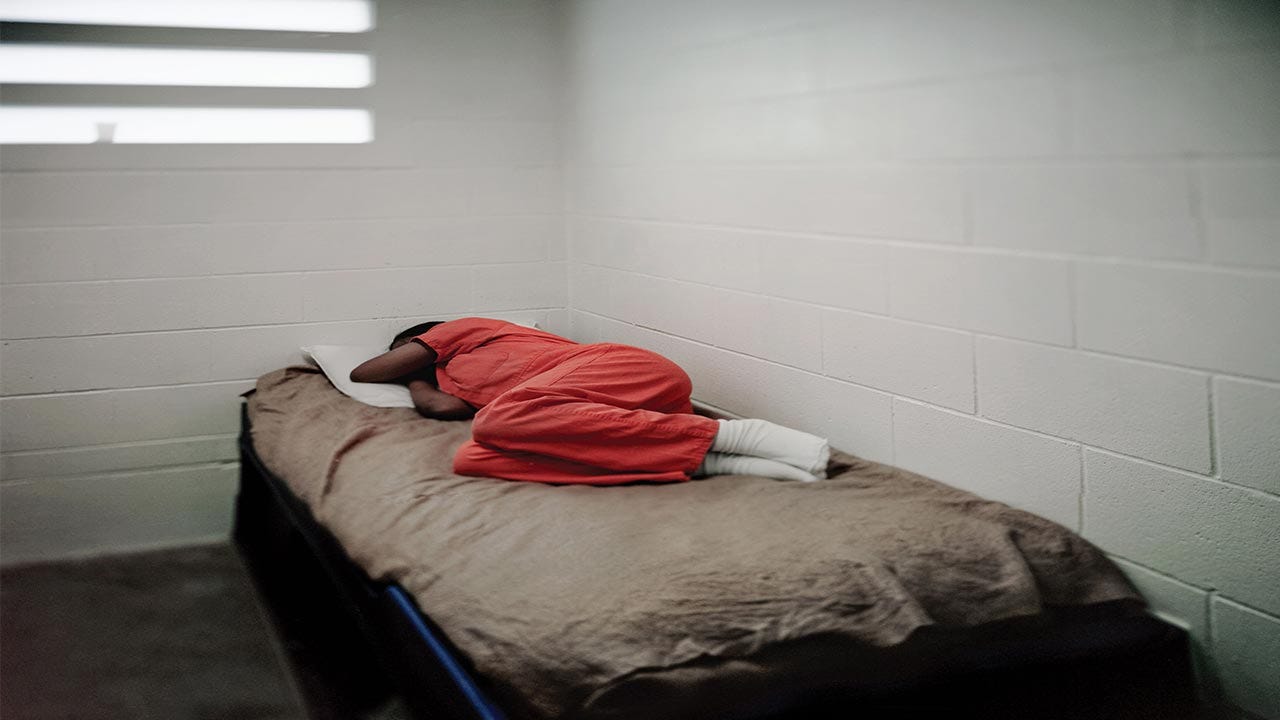
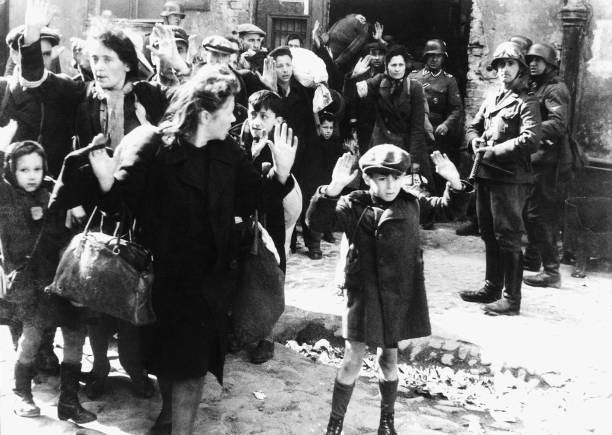
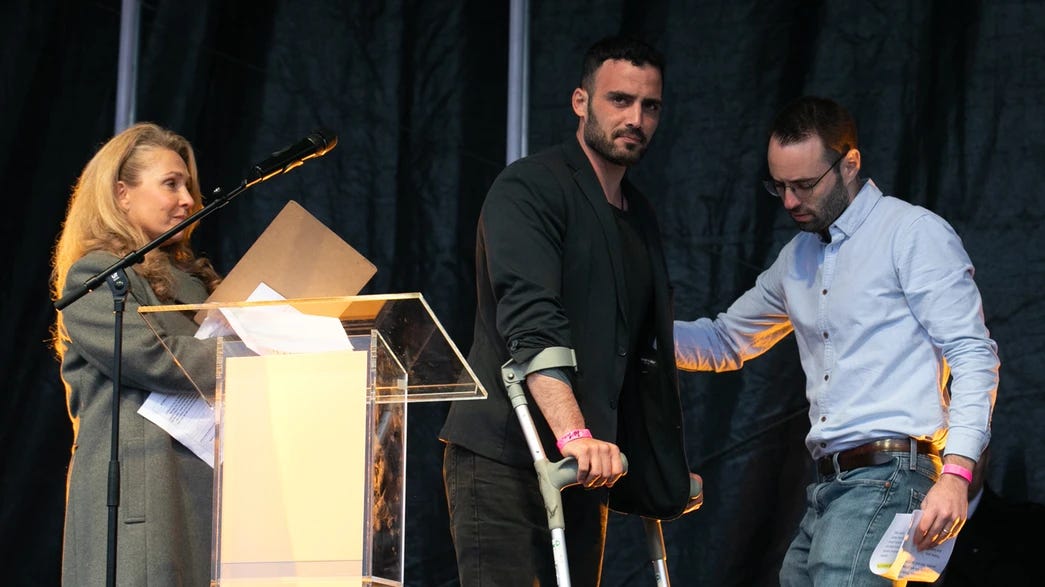
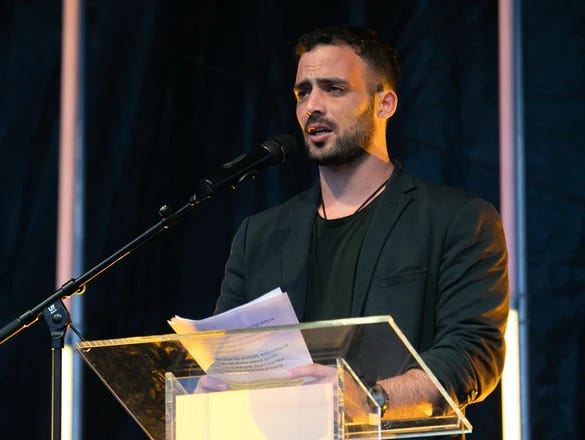
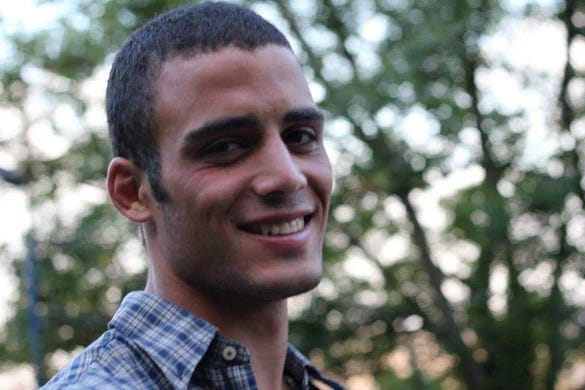
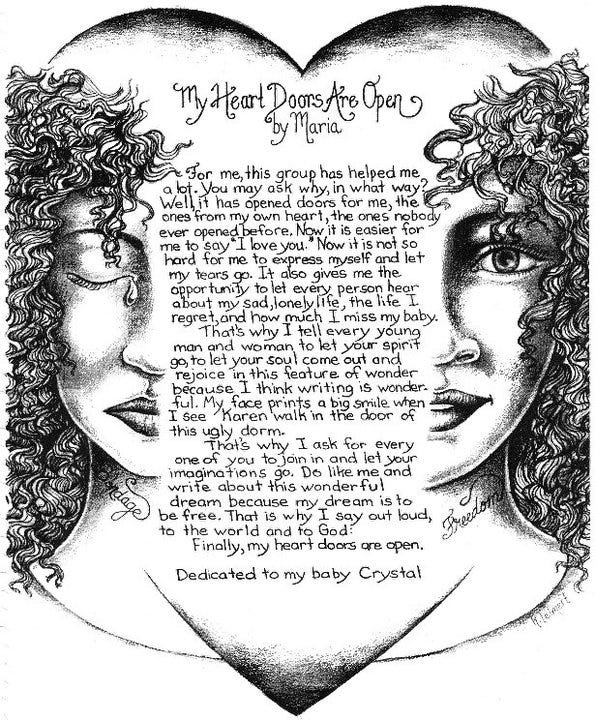
Beautiful Karen. Hats off. Walking the walk, not just talking the talk. I saw Deri here in London at Hyde Park and people were in tears when he spoke. On contrary I have never seen tears or calls for peace from any pro-Palestine rally here. Not one.
Quoting: I have news for you. We are all Zionists in our own countries.
We all want a safe homeland. We all expect our government to defend us with a strong military. Right now, across Europe, Great Britain and the United States, citizens are angry that their governments aren’t doing more to stop the invasion of illegal immigrants that threaten their security, their safety, their right to live freely in their own countries. Illegal immigration is perhaps the biggest issue of this presidential election.
~
Everyone has a right to preserving their homelands, culture, religion, values, etc, except for people of European descent.
Imagine the uproar if millions of European soccer hooligans began marching into Pakistan, Malaysia, or Nigeria with the intention of taking them over.
Those nations would use their militaries to stop them.